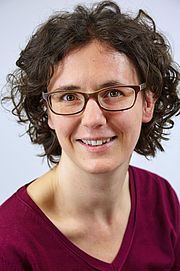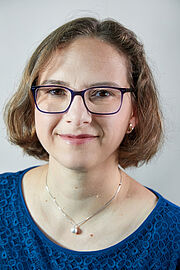Professor Annette Reineke, Vice-President of Research at Hochschule Geisenheim University, presented the colorful event on January 21, 2020 in the Gerd Erbslöh auditorium and expressed her pleasure that so many employees and students had "availed of this wonderful opportunity to gain an insight into the work carried out at our University outside of lectures, committees and the like."
Professor Rieke Hansen, who holds Hochschule Geisenheim University's first tenure-track professorship for open space and ecological urban design, kicked things off with her lecture entitled, "Welcome to the Anthropocene - open space design in an era of major acceleration". Given that cities account for a mere two percent of the earth's surface, but 55 percent of the world's population, a number of issues have to be radically questioned and it is essential to understand what a complex system a city actually is. In this context, she addressed the major challenges involved in finding solutions: "where do we do what and at whose expense do we do it, so that we can not only live in a safe, but also fair world?" She aims to demonstrate possibilities for a new urban design culture and also to become involved at regional level in order to play a part in the sustainable development of cities, because "open spaces are as equally important as our transport system."
In his fascinating lecture entitled, "Where do we land? - everyday spaces now", Professor Jan Dieterle, who holds the Professorship for Landscape Architecture Design, gave a range of insights into his previous fields of activity around the globe. "If we all lived as we do in Germany, we would need three planets," he warned, referring to the sustainable design of urban spaces. Whether we are dealing with a scarcity of water or streets flooded during the monsoon season, for example, Dieterle says it is important to find creative solutions for "tricky problems". "Design as creative forward-thinking" is his motto, which he would like to pass on to his students.
In the final lecture, Professor Jürgen Wendland also addressed a type of open-space development, namely fungi. The Professor for Beverage Microbiology, took a closer look at humans as holobionts, i.e. "a mosaic of microbes", in his inaugural lecture entitled, "Yeasts - a clash of cultures". Wendland presented research findings on yeast strains, some of which are more than 120 years old, as well as insights into the vineyards of the future, where pesticide use could be reduced using beneficial microbes.
























